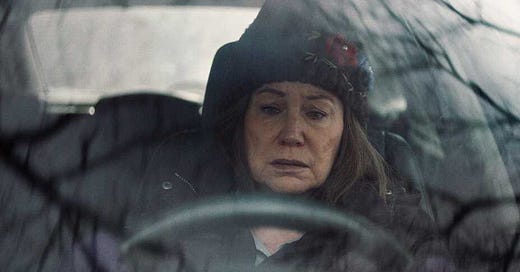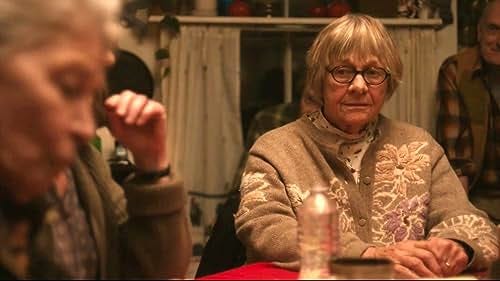One Good Film: "Diane" (2019)
Mary Kay Place stars in an exquisite small-town drama.
A regular feature for paid Watch List subscribers: I suggest one reasonably under-the-radar movie from the recent or distant past, and you do what you want with that information.
But first, for non-paying newcomers (of whom there have been quite a few recently), I refer you back to a popular early Watch List discovery — one of this newsletter’s Greatest Hits, really — “Riders of Justice” (2020, ⭐ ⭐ ⭐ 1/2), which looks like a B-movie vigilante flick but is in fact funnier, sadder, more thoughtful, and more deranged. (Plus, it stars Mads Mikkelsen, so how bad can it be?) My 2021 review is here and the movie itself is currently streaming on Hulu and Kanopy and a $2.99 rental on Amazon, Apple TV, YouTube, and elsewhere. Enjoy.
Diane (2019, ⭐ ⭐ ⭐ ⭐, streaming on AMC+ and Kanopy, for rent on Amazon, Apple TV, Google Play, and YouTube) — It’s always a treat to see a familiar actor used in unfamiliar ways, and in the case of Mary Kay Place (above) – a known face since the soap opera parody “Mary Hartman, Mary Hartman” in the late 1970s – Diane” is something more than a treat. It’s a long-overdue validation.
Writer-director Kent Jones’ lovely, minor-key drama about a small-town Good Samaritan who helps her community without ever quite being part of it represents Place’s first lead film role after a lifetime of supporting performances in everything from “The Big Chill” and “Pvt. Benjamin” to TV’s “Grey’s Anatomy” and “Grace and Frankie.”
The actress rewards the filmmaker with a quietly phenomenal performance, one that leaves lingering shades of empathy and rue long after the movie’s over. In my Boston Globe review, I called the title character “a giver, a doer — one of those small-town ladies always ready with a casserole, at a hospital bedside, ladling out supper in a soup kitchen. … Diane is an average woman, with fairly average long-ago sins. Coming to terms with those sins late in life is the movie’s business. The movie has commonalities with “Manchester by the Sea” — like that film, “Diane” unfolds in a wintry Massachusetts (although it was shot near Kingston, N.Y.), and like that film it centers on a character who seems to have been forgiven by everybody but herself.”
We learn that Diane has a grown son, Brian (played by Jake Lacy, above, of “The Office” and “The White Lotus”), a recovering heroin addict who’s not recovering as well as he might. The scenes between mother and son are painful and will, for some, be painfully recognizable, but they underscore the movie’s themes of aloneness and connection. Brian begs his mother to “leave him be” so he can right himself on his own; later, Diane will ask the same of him. As the film deepens, Jones lets us notice small details of his heroine’s life – a copy of Emily Dickinson on a bedside table, a late husband who’s never discussed, a wedding ring that stays guiltily on – and we see that Diane herself has drawn a large, invisible circle around her life, one that keeps loved ones at a distance and that is filled, we come to understand, with shame.
From my Globe review: “‘Diane’ is, among other things, a film about women — older women, especially — getting through the daily wreckage of life with weariness and grace. There are scenes of communal gathering that can take your breath away, with Diane’s friends and relatives played by such welcome faces as Estelle Parsons (below, as Diane’s indomitable aunt), Andrea Martin (as an upbeat old friend), Glynnis O’Connor, Joyce Van Patten, and a dryly hilarious Phyllis Somerville as one of those ancient battle-ax relations who’ll keep smoking until it kills her.
“Within this world — as recognizable to you or me as snow drifting across a rural highway — Place’s performance anchors itself with endurance and regret. … ‘Diane’ builds to moments small and large, occasionally skipping across the years with abruptness or diverting into the title character’s dreams and memories. It ends rather daringly. But Jones also knows to leave well enough alone, as in a long, wordless sequence in which Diane goes to a local roadhouse and drinks herself into looking her sorrows in the eye, punching up oldies on the jukebox as a form of penance. (That live version of Dylan’s ‘Tonight I’ll Be Staying Here With You’ has never sounded so mocking.)
“It’s key to the movie that she’s not alone in this scene, even if she thinks she is, and that a web of community surrounds her with concern and love. Without making a big deal about it, ‘Diane’ explores questions of faith, but it ultimately finds greater spiritual meaning among the living. I found myself wishing I could show it to Dianes I have known; you may, too. It’s less a movie than a familiar home on a country road at dusk, its windows lit up in welcome. Come in, it says. You’re never as alone as you think.”
Please don’t hesitate to weigh in. We love to hear your thoughts here at the Watch List.
If you enjoyed this edition of Ty Burr’s Watch List, feel free to pass it along to others.
If you’re not a paying subscriber and would like to sign up for additional postings and to join the discussions — or just help underwrite this enterprise, for which the author would be eternally grateful — here’s how.
You can give a paid Watch List gift subscription to your movie-mad friends —
Or refer friends to the Watch List and get credit for new subscribers. When you use the referral link below, or the “Share” button on any post, you'll:
Get a 1 month comp for 3 referrals
Get a 3 month comp for 5 referrals
Get a 6 month comp for 25 referrals. Simply send the link in a text, email, or share it on social media with friends.
There’s a leaderboard where you can track your shares. To learn more, check out Substack’s FAQ.






